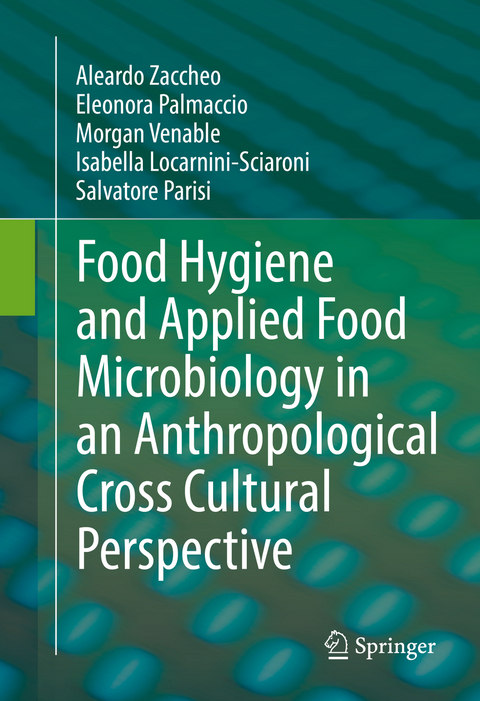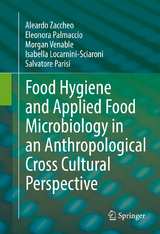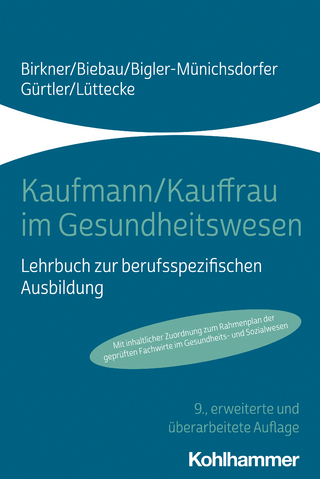Food Hygiene and Applied Food Microbiology in an Anthropological Cross Cultural Perspective
Springer International Publishing (Verlag)
978-3-319-44973-9 (ISBN)
The book demonstrates that food safety is a multidisciplinary scientific discipline that
is specifically designed to prevent foodborne illness to consumers. It is generally assumed
to be an axiom by both nonprofessionals and professionals alike, that the most
developed countries, through their intricate and complex standards, formal trainings
and inspections, are always capable of providing much safer food items and beverages
to consumers as opposed to the lesser developed countries and regions of the world.
Clearly, the available data regarding the morbidity and the mortality in different areas
of the world confirms that in developing countries, the prevalence and the incidence of
presumptive foodborne illness is much greater. However, other factors need to be taken
into consideration in this overall picture: First of all, one of the key issues in developing
countries appears to be the availability of safe drinking water, a key element in any
food safety strategy. Second, the availability of healthcare facilities, care providers, and
medicines in different parts of the world makes the consequences of foodborne illness
much more important and life threatening in lesser developed countries than in most
developed countries.
It would be therefore ethnocentric and rather simplistic to state
that the margin of improvement in food safety is only directly proportional to thelevel of development of the society or to the level of complexity of any given national
or international standard. Besides standards and regulations, humans as a whole have
evolved and adapted different strategies to provide and to ensure food and water safety
according to their cultural and historical backgrounds. Our goal is to discuss and to
compare these strategies in a cross-cultural and technical approach, according to the
realities of different socio-economic, ethnical and social heritages.
Aleardo Zaccheo is plant pathologist and a food microbiologist trained in Switzerland and California. Has received a Bachelor Degree at Fresno State University, Master Degree and Post Graduate in Genetic Engineering at San Francisco State University. In 1992 has cofounded and he is the CEO of bioethica food safety engineering. Eleonora Palmaccio is from Formia, Italy. She received her Master Degree in Biology and Postgraduate Diploma at the University La Sapienza in Rome. She has worked for the Italian National Institute of Health in food safety. She is currently a senior assistant at bioethica food safety engineering. Morgan Venable is from San Rafael, California. She received her Bachelor of Science in Nutrition from the University of Connecticut and continued her post graduate studies at East Carolina University. She currently works as a Consulting Registered Dietitian providing medical nutrition therapy. Isabella Locarnini-Sciaroni is from Monte Carasso Switzerland. She received her Bachelor and Master Degree at the Institute of Food, Nutrition and Health of the Swiss Federal Institute of Technology Zurich (ETHZ). After conducting her thesis in at bioethica food safety engineering, she became the quality manager of the family's company. Salvatore Parisi, Msc, PhD, is a research chemist working as an expert consultant, reviewer and academic lecturer in different fields, including food chemistry and technology, food packaging chemistry and technology, and quality certification systems. Dr. Parisi serves as Series Editor for the SpringerBriefs in Molecular Science: Chemistry of Foods.
Foreword.- Preface.- 1. The Complex Relationships Between Humans, Food, Water and Hygiene.- 2. A Brief History of Food, Food Safety and Hygiene.- 3. Food Microbiology Seen from Different Angles.- 4. The Viruses.- 5. The Bacteria.- 6. The Fungi and Other Eukaryotic Microbes.- 7. The Human Behavior and Food Resources.- 8. The Human Microbiomes.- 9. The Global Microbial Environments.- 10. The Local Food Environments.- 11. Biocides and "Superbugs".- 12. Food Safety Considerations About Selected Causative Agents.- 13. Conclusions and Recommendations for those outside or inside the "Global Village".- References.- Index.
| Erscheinungsdatum | 24.11.2016 |
|---|---|
| Zusatzinfo | XI, 109 p. 2 illus., 1 illus. in color. |
| Verlagsort | Cham |
| Sprache | englisch |
| Maße | 155 x 235 mm |
| Themenwelt | Studium ► Querschnittsbereiche ► Prävention / Gesundheitsförderung |
| Technik ► Lebensmitteltechnologie | |
| Schlagworte | Anthropology • Chemistry and Materials Science • Food and beverage technology • Food Hygiene • Food Microbiology • Food Safety • food science • Public Health • Public health and preventive medicine |
| ISBN-10 | 3-319-44973-7 / 3319449737 |
| ISBN-13 | 978-3-319-44973-9 / 9783319449739 |
| Zustand | Neuware |
| Haben Sie eine Frage zum Produkt? |
aus dem Bereich




